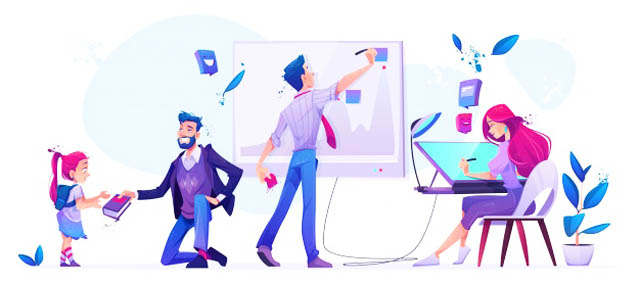Corporate Skills
Seven Things To Keep In Mind During Your Student To Employer Transition
Post date: 2020-04-12 07:15:28 After graduation from a college, you are no longer a student, and it’s a life-changing transition and terrific planning, where suddenly you are expected to act like an adult. This transition may seem complicated, but there are ways by which you can successfully transition from your university/college to the next phase i.e., the professional career of your life and get your job the best start.
The primary key is to make a plan of action as early as possible and try to follow it. The strategy of action must be evolved from your career goals, internship experience, and your potential area where you think you can contribute. So, here are some tips that will guide you through this successful transition from your student life to a successful career.

-
You must do your best to accept the changes around you. Your fun and relax social life will change, as you have to get used to waking up in early mornings, have to fulfill commitments on time. The way you react and converse must be changed, no longer will your mistakes be minor flaws. When stepping into corporate life, things would take a turn and will expect you to do the same. Try to adjust with the little changes in your social life and embrace the changes as an opportunity for your personal growth and learning.
-
it in your account that as an employee, you are getting paid only to execute a fixed assignment. And failing to meet the deadline will not only end with a disappointment of your employer, but your job quickly finds out someone better than you. At times, the replacement may come even without notification. So be serious about your responsibilities!
-
Try to adopt things quickly:
new employer and the teammates will help you to get a good grip over your new role that comes with the new responsibilities. But your proactive behavior is equally important. Remember that you have already learned how to work under pressure, how to manage your time, how to sharpen your personal development in your college/ university days. Put all these in your new transition period. Always keep in mind, you will get 3 to 6 months to settle down in your new role, so don’t take unnecessary pressure that may hamper your performance.

-
Don’t be shy to ask a question:
stay aware of your surroundings and be in touch with your superiors and other teammates to get the right experience and guidance throughout your internship. It’s entirely reasonable that you have gathered a high level of knowledge, got certificates in the last years of studies, but in the real world, you soon may realize that you don’t know the maximum of the things. So there is no reason to shy. Ask questions! As being a fresh graduate, your employer appreciates your energy, curiosity, and your eagerness to learn new things. You have to indicate your willingness to work hard; most of the employers will help you to reach your goals. So, you need to communicate.

-
Challenge yourself:
you are looking for a placement, and it is essential to find the challenging job that gives you the freedom to shape you up and distinguish you from the large pool of job applicants based on your experiences. Try to develop essential skills and industry knowledge that may benefit you to get a better position in your field. Before applying for your initial job applications, give a thought whether this a job for the point of just having a defined salary, or it will allow you to gain experience, new skills. It will distinguish you from the other applicants.
-
Grow your professional network:
a new professional, creating a system is undoubtedly the most important thing. Meeting like-minded people, and new professionals with creative minds can be rewarding and fun, from both the professional and personal ground. Try to build a network based on your strengths and interests.

-
Finally, be yourself! Give the best of you:
that your first job just after your college/university days are most likely to be the entry-level where your primary task is to get as much as job experience as possible. Learn as much as you can. Try to meet the deadlines. Be responsible for your work. Ask questions. Find new friends with your co-workers. And don’t consider your first job as your last one. Try to gather as much experience as you can from your current position then move on for the better option.










